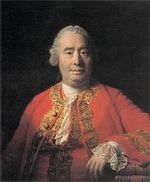
Back مبحث في الفاهمة البشرية Arabic Zkoumání o lidském rozumu Czech Eine Untersuchung über den menschlichen Verstand German Investigación sobre el entendimiento humano Spanish کاوشی در خصوص فهم بشری Persian Tutkimus inhimillisestä ymmärryksestä Finnish Enquête sur l'entendement humain French मानव समझ के संबंध में अन्वीक्षा Hindi Rannsókn á skilningsgáfunni Icelandic Ricerca sull'intelletto umano Italian
| Author | David Hume |
|---|---|
| Language | English |
| Subject | Philosophy |
Publication date | 1748 |
| Preceded by | A Treatise of Human Nature |
| Followed by | An Enquiry Concerning the Principles of Morals |
| Text | An Enquiry Concerning Human Understanding at Wikisource |

An Enquiry Concerning Human Understanding is a book by the Scottish empiricist philosopher David Hume, published in English in 1748.[1] It was a revision of an earlier effort, Hume's A Treatise of Human Nature, published anonymously in London in 1739–40. Hume was disappointed with the reception of the Treatise, which "fell dead-born from the press,"[2] as he put it, and so tried again to disseminate his more developed ideas to the public by writing a shorter and more polemical work.
The end product of his labours was the Enquiry. The Enquiry dispensed with much of the material from the Treatise, in favor of clarifying and emphasizing its most important aspects. For example, Hume's views on personal identity do not appear. However, more vital propositions, such as Hume's argument for the role of habit in a theory of knowledge, are retained.
This book has proven highly influential, both in the years that would immediately follow and today. Immanuel Kant points to it as the book which woke him from his self-described "dogmatic slumber."[3] The Enquiry is widely regarded as a classic in modern philosophical literature.
- ^ See Hume, David (1748). Philosophical Essays Concerning Human Understanding (1 ed.). London: A. Millar. Retrieved 28 June 2014. via Google Books
- ^ Hume, David (1776), My Own Life, Appendix A of Ernest Campbell Mossner, The Life of David Hume, University of Texas Press, 1954.
- ^ I. Kant "Prolegomena to Any Future Metaphysics"
© MMXXIII Rich X Search. We shall prevail. All rights reserved. Rich X Search